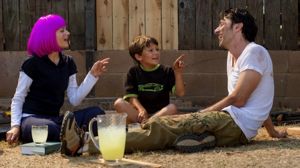Let's get this out of the way: I was not a Garden State fan. When I first heard there would be a follow-up to your directorial debut, my initial thought was: "Oh dear." But I was pleasantly surprised by Wish I Was Here. It charmed me in spite of my usual visceral rejection of all things schmaltzy and earnest. It is undeniably schmaltzy, as family dramedies tend to be.
You've put Aidan Bloom's life in disarray when the film opens, and it unravels even further as he struggles to cope with an acting career that has failed to launch, a terminally ill father, and a strained marriage--on top of which he decides, on a whim, to start homeschooling his two children. What Aidan goes through isn't quite a midlife crisis, but a crisis I think is unique to thirtysomethings; the expectation of having achieved a certain degree of wisdom and stability clashes spectacularly with the realization that you still have no idea what you're doing.
While the melodrama edges a bit close to being overwrought - especially when you incorporate those heavier questions of faith, belief, and spirituality - I appreciated the relief valves you installed in the narrative. They keep things from tipping over into preachiness. Moments of sitcom humour and physical comedy (like a rabbi on a Segway) might seem out of place at first, but they occur at just the right time: right before my eyes rolled into the back of my head.
Your caustic, irreverent dialogue also helps to keep everything on the right side of earnestness. When characters relentlessly wisecrack in the face of tragedy or hardship it can often feel jaded, but you manage to maintain the characters' sense of warmth and empathy.
But while the comedy is welcome, I can't say the same for most of the film's various subplots. With the exception of Aidan's wife gradually coming into her own by, intriguingly enough, finding her bliss in a degree of independence from her family, the subplots centered around supporting characters like Aidan's brother feel forced and unnecessary. Aidan's sci-fi dream sequences felt a lot like cut scenes in a video game--I wanted to skip over them, but was powerless to do so.
For a light-hearted story of a family in crisis, you bring a lot of heavy baggage. But I applaud your ability to avoid whacking the audience over the head with excessive epiphanies and neatly tied-up endings. By the end of the film, there is catharsis for all involved. But I wouldn't go as far as to say the characters - Aidan in particular - are any wiser than when we first meet them. I appreciated that. The heart of the film lies in its characters finding strength by standing on their own while they stand together. It's a touch saccharine—but not so much that your teeth hurt.
Best,
Nat.







